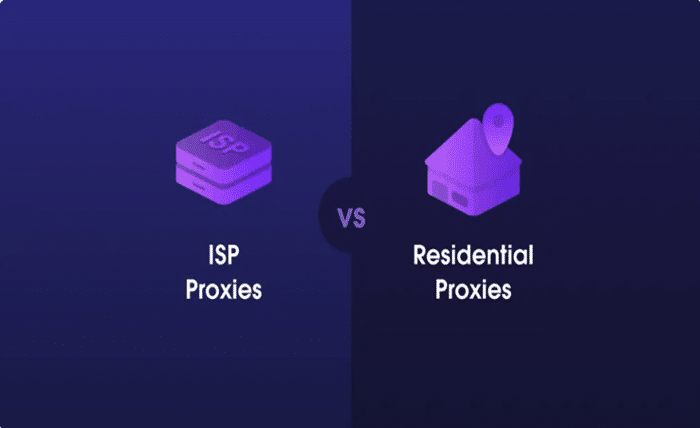ISP Proxies vs Residential Proxies: Differences and Use Cases for Your Needs

When navigating the online world, proxies play a crucial role in enhancing security, privacy, and performance. Two common types of proxies are ISP proxies and residential proxies, each with its own set of advantages and challenges. Understanding the differences between ISP proxies vs residential is essential when selecting the best solution for various online activities, from web scraping to online marketing. This article will delve into the key features, differences, and use cases of ISP proxies and residential proxies, providing guidance on when to choose each option.
Key Features or Insights
ISP Proxies
ISP proxies are a category of proxies that are provided by internet service providers. These proxies are typically characterized by high-speed connections and stable performance. ISP proxies use dedicated IP addresses that are linked directly to an ISP, which helps ensure consistent uptime and minimal latency. While they offer excellent performance and are often used for tasks requiring speed, such as managing e-commerce sites or handling high volumes of traffic, ISP proxies are less flexible when it comes to bypassing restrictions like geographical blocks.
- Advantages: High speed, reliability, stable performance.
- Challenges: Limited anonymity compared to residential proxies, potentially easier to detect by websites.
Residential Proxies
On the other hand, residential proxies are IP addresses that are assigned by Internet Service Providers (ISPs) to homeowners. These proxies are typically associated with real devices, making them more challenging to detect as proxies. Residential proxies are favored for tasks that require greater anonymity, such as web scraping, data mining, and accessing geo-restricted content. However, they tend to be more expensive than ISP proxies and may have variable performance due to the reliance on actual user devices.
- Advantages: Enhanced anonymity, flexible access to geo-blocked content.
- Challenges: Higher cost, potentially slower speeds due to reliance on consumer-grade networks.
Detailed Comparison or Analysis
The differences between ISP proxies vs residential can significantly impact the effectiveness of their use in various scenarios. Let’s explore the comparison across a few important factors:
1. Performance
- ISP proxies typically offer faster and more consistent speeds because they are backed by ISPs and utilize high-performance data centers. Their dedicated IP addresses make them ideal for high-demand activities like managing multiple accounts or automating tasks that require quick responses.
- Residential proxies, however, may exhibit fluctuating performance. As they are tied to real user devices and networks, the speeds can vary based on factors like network congestion and device capabilities. This makes them less reliable for high-speed tasks but suitable for tasks where anonymity and geographical flexibility are prioritized.
2. Anonymity and Security
- ISP proxies, though fast, often lack the anonymity residential proxies offer. Since ISP proxies are linked to an actual ISP, websites and services may recognize them as proxies and block access, especially if the same IP addresses are frequently used.
- Residential proxies offer superior anonymity as they mimic regular user traffic. The IPs are harder to trace, making them less likely to be detected and blocked. This makes them ideal for activities like web scraping or accessing region-locked content.
3. Cost
- ISP proxies tend to be more affordable because they are often sold in bulk by ISPs, and the infrastructure costs are lower compared to residential proxies.
- Residential proxies come at a higher cost due to the complexities of sourcing IP addresses from actual users and the increased maintenance required. Their price may vary significantly based on factors such as the number of IPs, geographical location, and traffic volume.
4. Flexibility
- ISP proxies are less flexible in terms of bypassing geographic restrictions or handling a wide range of IP rotation needs. They are often used in specific applications where high speed and reliability are needed without concerns over geographical barriers.
- Residential proxies offer more flexibility, allowing users to route traffic through a wide variety of IP addresses across different regions. This makes them ideal for tasks that require accessing content in specific countries or for anonymized web scraping across multiple sites.
Use Cases or Scenarios
Each type of proxy serves specific purposes and excels in particular scenarios.
ISP Proxies:
- E-commerce Management: Online stores often rely on ISP proxies to manage large volumes of traffic, run automated bots, or protect their websites from malicious activities.
- Social Media Automation: Businesses that automate social media tasks, such as creating and managing multiple accounts, use ISP proxies to avoid detection and maintain fast connection speeds.
- Market Research: When businesses need fast, consistent access to competitor data or customer insights, ISP proxies are a solid choice for scraping and browsing.
Residential Proxies:
- Web Scraping and Data Mining: Residential proxies are commonly used by data scraping businesses or individuals who need access to large datasets from websites that block traditional proxies.
- Ad Verification: Digital marketers use residential proxies to ensure that their ads are displayed correctly across different geographical regions, making them essential for ad verification tools.
- Bypassing Geographical Restrictions: When accessing content locked to specific countries or regions, residential proxies are the go-to solution. They allow users to appear as though they are browsing from the targeted location.
Conclusion
In summary, both ISP proxies vs residential offer distinct advantages based on the specific needs of the user. ISP proxies are ideal for high-speed tasks, e-commerce, and social media automation, offering performance and reliability. However, they are less anonymous and more easily detectable. Residential proxies, with their superior anonymity and ability to bypass geographic restrictions, are the preferred choice for activities like web scraping, ad verification, and bypassing content blocks, albeit at a higher cost.
When selecting between ISP proxies and residential proxies, consider the specific requirements of your use case, including performance, anonymity, flexibility, and budget. By understanding these differences, you can make an informed decision on the best proxy solution for your needs.




